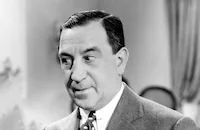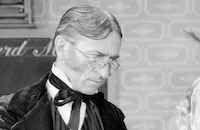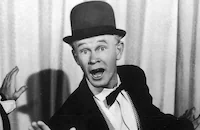Mrs. Wiggs of the Cabbage Patch
Brief Synopsis
Cast & Crew
Ralph Murphy
Fay Bainter
Carolyn Lee
Hugh Herbert
Vera Vague
John Archer
Film Details
Technical Specs

Synopsis
Ever since her husband left for the Klondike gold fields three years earlier, Mrs. Elvira Wiggs has raised her children with a bounty of love in the poverty-stricken area known as the Cabbage Patch. When her son Billy finds an abandoned sick horse, Mrs. Wiggs works to revive the animal to help Billy with his wood-hauling business. Her daughters Europena and Asia beseech Dr. Robert Redmond, who is newly in practice, to treat the horse for no money. Bob breaks a dinner date with his fiancée, Lucy Olcott, and works until morning to rescue the animal. Later, Lucy's snobbish uncle, Henry Olcott, head of the local hospital, insults Bob because his first patient is a horse. When the Children's Aid Society brings the Wiggs family a basket of food for Thanksgiving, they suggest to Mrs. Wiggs that she give up two of her children for adoption because of her extreme state of poverty. Mrs. Wiggs is appalled by the prospect of losing her children and reminds the women that "man cannot live by bread alone." The women accuse her of being ungrateful, so she forces them to take back their food. Bob, however, now sympathetic to the Wiggses, hears of the story and brings them another basket of food. Jimmy Wiggs soon falls seriously ill, and Bob insists that he be hospitalized and assumes responsibility for the bill. Mrs. Wiggs's neighbor, Miss Tabitha Hazy, in the meantime, entertains Marcus P. Throckmorton, president of a mail-order matrimonial agency, with hopes of ordering herself a husband. Throckmorton soon learns that federal agents have closed his agency, so he tries to sell himself to Miss Hazy as a suitor. After some time, Olcott insists that Jimmy be sent to a county hospital because he is suffering from malnutrition and is taking the bed of a paying customer. Bob refuses and when he urges Lucy to elope with him, she declines because she does not want to alienate her uncle. Lucy's sympathies are not completely hardened, however, as she helps Billy get his family five tickets to a traveling stage show. The Wiggs family has never experienced such an extravagant treat, but their evening is shattered when Mrs. Wiggs is called to Jimmy's side as he dies. Despite their loss, the Wiggses host Miss Hazy and Marcus' wedding at their home. Mr. Wiggs, finally returning home from the Klondike, assumes the wedding is his wife's remarriage and boards an outbound freight train. The same night, Marcus glimpses Miss Hazy dismantling her sewing mannequin and mistakes the body parts for her own. Terrified, he escapes on a freight train and encounters Mr. Wiggs. The next morning, the Children's Aid Society, empowered by state authorities, come to take Mrs. Wiggs's children because Jimmy's death was hastened by malnutrition. Mrs. Wiggs is about to sign the adoption agreement when Mr. Wiggs returns to save his family, while Marcus reunites with Miss Hazy.

Director
Ralph Murphy
Cast

Fay Bainter
Carolyn Lee

Hugh Herbert
Vera Vague

John Archer

Barbara Britton
Betty Brewer

Moroni Olsen

Carl Switzer
Mary Thomas
Billy Lee
Betty Farrington
Ethel Griffies

Janet Beecher
Harry Shannon

Clem Bevans
John Sheehan

Olin Howlin
Lon Poff
Edward Clark
George Guhl
Si Jenks
Isabel Withers
George H. Reed
Frances Morris
Edward Gargan

William Benedict

Chester Conklin
Harry Bradley
Jack Baxley
Gloria Williams
Jack Taylor
Bill Wolfe
George Barrows
Buster Brodie
Crew
Doris Anderson
Anne Bauchens
Hans Dreier
George Dutton
William Flannery
Harve Foster
William Slavens Mcnutt
Ralph Murphy
Walter Oberst
Sol C. Siegel
Jane Storm
Leo Tover
Wally Westmore
Victor Young

Film Details
Technical Specs

Quotes
Trivia
Notes
Vera Vague was the radio character name of actress Barbara Jo Allen. Hollywood Reporter news items indicate that Lillian Gish was considered for the lead, and that John Fante worked on the screenplay; however, his contribution to the film has not been confirmed. Hollywood Reporter news items also report that Mel Ronson wrote special material for Allen, and Paramount News clippings indicate that actor Hugh Herbert contributed his own dialogue for one of the closing scenes. M-G-M loaned actress Fay Bainter for her role in the production. Other films based on Alice Hegan Rice's novel and the play by Rice and Anne Flexner Crawford are California Motion Picture Corp.'s 1914 production, Mrs. Wiggs of the Cabbage Patch, directed by H. Entwhistle and starring Beatriz Michelena and Blanche Chapman; Paramount's 1919 film Mrs. Wiggs of the Cabbage Patch, directed by Hugh Ford and starring Marguerite Clark and Mary Carr (see AFI Catalog of Feature Films, 1911-20; F1.3006 and F1.3007); and Paramount's 1934 film, directed by Norman Taurog, written by Jane Storm and William Slavens McNutt, and starring Pauline Lord, W. C. Fields and ZaSu Pitts (see AFI Catalog of Feature Films, 1931-40; F3.2932).












